#SAP modules
Explore tagged Tumblr posts
Text
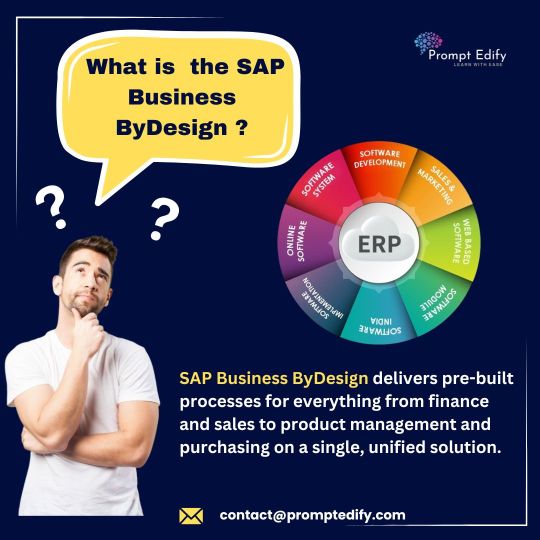
Comprehensive SAP Business ByDesign Training: Join Prompt Edify's dynamic training program in Mozambique, designed to equip professionals with the essential skills to leverage SAP Business ByDesign effectively.
Expert-Led Sessions: Learn from seasoned instructors who bring real-world experience and in-depth knowledge to every session, ensuring you grasp the intricacies of SAP's powerful business management solution.
Tailored Curriculum: Our training is structured to meet the diverse needs of learners, covering everything from core functionalities to advanced features, ensuring you gain a holistic understanding of SAP Business ByDesign.
Hands-On Learning: Dive into practical exercises and simulations that replicate real-world scenarios, allowing you to apply theoretical concepts directly to your business environment.
Interactive Learning Environment: Engage in collaborative discussions, Q&A sessions, and group activities that foster a dynamic learning atmosphere, enabling you to learn from peers and industry experts alike.
Flexible Training Options: Choose from flexible training schedules to accommodate your busy lifestyle or organizational requirements, whether you prefer weekday classes or weekend sessions.
Certification Preparation: Prepare for SAP Business ByDesign certification exams with confidence, as our training program aligns with industry standards and equips you with the knowledge needed to excel.
Career Advancement Opportunities: Enhance your professional profile and career prospects with SAP Business ByDesign certification, demonstrating your expertise and proficiency in one of the leading ERP solutions.
Convenient Location: Located in Mozambique, our training center offers a convenient location for professionals across the region, minimizing travel time and maximizing learning efficiency.
Unlock Business Potential: Gain the skills and insights needed to unlock the full potential of SAP Business ByDesign, empowering your organization to streamline operations, drive growth, and stay competitive in today's dynamic market.
Enroll in SAP Business ByDesign training at Prompt Edify in Mozambique today and take the first step towards mastering this transformative business solution!
📱 (+91) 99932 86938 📧 [email protected] 🌐 www.promptedify.com 🔗 You can chat with us on WhatsApp 📑 Book your spot now👉 Register Now
#sap certification#sap online training#sap modules#sap course#sap_certification#sapconsultant#sap consulting services#career in sap
2 notes
·
View notes
Text

The SAP Modules - Benefit from the author's experience, Advance your SAP Knowledge
Written by Mr. P. K. Agrawal, former Program Manager in Tata Technologies Limited, Pune. Mr. Agrawal is an out-of-the-box thinker and published many books on SAP with unique approach.
Buy these books on special offer of 40% discount from our website. Log on to https://www.phindia.com/Books/SpecialOffer
2 notes
·
View notes
Text
According to Precedence Research Reports, the global smart manufacturing market is valued at USD 226 Billion in 2022 and is projected to reach a substantial USD 985 Billion by 2032. Production vs Manufacturing: Know the Difference
0 notes
Text
Understanding SAP: The Backbone of Modern Business Operations
In today’s fast-paced business world, companies rely heavily on digital systems to streamline operations, manage data, and boost productivity. One such powerful tool is SAP – a globally recognized ERP (Enterprise Resource Planning) software that has revolutionized how organizations function. This blog explores what SAP is, why it’s essential, and how it drives modern business operations.
What is SAP?
· SAP stands for Systems, Applications, and Products in Data Processing.
· It was founded in 1972 in Germany by former IBM engineers.
· SAP provides integrated business solutions that manage everything from finance to supply chain, HR, and customer relations.
· Its core product is SAP ERP, now evolved into SAP S/4HANA.
SAP helps businesses run efficiently, make informed decisions, and stay competitive in a global market.
Why Businesses Use SAP
SAP is preferred because it:
· Centralizes data across departments
· Automates routine processes
· Reduces manual errors
· Improves reporting and decision-making
· Ensures regulatory compliance
Key Benefits:
· Real-time data processing
· Enhanced productivity
· Reduced operational costs
· Better customer satisfaction
· Scalable solutions for small to enterprise-level businesses
Core SAP Modules That Support Business Operations
SAP’s strength lies in its modular structure. Each module is tailored to a specific business function.
1. SAP FI (Financial Accounting)
· Handles financial transactions
· Generates balance sheets, P&L statements
· Used by accounting teams for budgeting and audits
2. SAP CO (Controlling)
· Monitors internal costs
· Supports planning and performance tracking
· Used by finance controllers and project managers
3. SAP MM (Material Management)
· Manages procurement and inventory
· Tracks vendor performance and purchase orders
· Supports supply chain efficiency
4. SAP PP (Production Planning)
· Plans manufacturing and production processes
· Ensures product availability with accurate scheduling
5. SAP HCM (Human Capital Management)
· Manages employee records, payroll, hiring, and performance
· Enables self-service portals for HR tasks
6. SAP SD (Sales and Distribution)
· Manages sales orders, delivery, and billing
· Tracks customer interactions and product movement
How SAP Works Within an Organization
Step-by-step function:
· Data is entered once and used across all departments.
· Processes are automated to save time and resources.
· Reports are generated in real-time to aid decision-making.
· Employees collaborate more effectively using a single platform.
Example: When a sales order is placed, SAP automatically updates inventory, triggers invoicing, and reflects changes in financial records—without manual input.
Industries Where SAP is Widely Used
SAP is not limited to one type of business. It supports various sectors:
· Manufacturing – for production planning and logistics
· Retail – for supply chain and inventory management
· Healthcare – for patient records and hospital resource management
· Banking – for financial transactions and compliance
· Energy – for asset management and billing
· IT Services – for project management and resource planning
"SAP has become the digital core for many Fortune 500 companies."
The Evolution: From SAP R/3 to SAP S/4HANA
· SAP R/3 was the classic ERP system with on-premise servers.
· Now, SAP S/4HANA is cloud-compatible, faster, and more user-friendly.
· Powered by in-memory computing, S/4HANA processes large volumes of data in seconds.
· It supports AI, machine learning, and predictive analytics for smarter business decisions.
Advantages of Using SAP in Modern Business
Strategic Advantages:
· End-to-end integration of all departments
· Real-time data analysis for fast decision-making
· Customizable modules for specific business needs
· Compliance-ready reports for audits and legal requirements
Operational Benefits:
· Improved communication between teams
· Reduced duplication of efforts
· Streamlined workflows
· Easy scalability as the business grows
Careers and Opportunities in SAP
The demand for SAP professionals is constantly rising.
In-demand Roles:
· SAP Functional Consultant (FI, MM, SD, etc.)
· SAP Technical Consultant (ABAP Developer)
· SAP Basis Administrator
· SAP Project Manager
· SAP S/4HANA Specialist
SAP certifications increase job opportunities and salary potential globally.
Challenges Businesses May Face
While SAP offers many benefits, some challenges may arise:
· High initial implementation cost
· Complex learning curve
· Need for regular updates and maintenance
· Dependency on trained professionals
However, with proper planning and training, these challenges can be overcome.
Conclusion: Why SAP is the Backbone of Modern Business
SAP isn’t just a tool—it’s a strategic platform that empowers businesses to scale, adapt, and thrive in a competitive digital world.
With real-time data, automated processes, and deep integration across departments, SAP serves as the backbone of modern business operations.
Whether you're a business owner or a student looking to step into the world of enterprise tech, understanding SAP is a valuable asset in today's digital economy. For those aiming to build practical, job-ready skills, enrolling in an SAP Training Course in Noida, Delhi, Gurgaon, Bangalore, Mumbai, Hyderabad, Pune, Chennai, can offer hands-on experience and exposure to real-world business scenarios. These cities are known for their growing IT and business hubs, making them ideal locations to pursue SAP learning and career opportunities.
0 notes
Text

We are providing highly professional SAP installation services, GUI online server access, and Remote Desktop server access to various organizations in India and Worldwide. All SAP modules are in the best configuration with SSD hard drives for better speed.
We are offering all latest modules on Dedicated/Shared basis
Technical Hana Admin Shared Remote Access in Hyderabad call: 9052536969
SAP ERP Modules: - Dedicated /Shared Server * Sap ECC Abap/abap7.5 * S4Hana 1909/2020/2021/2022/2023 ABAP on Hana with Fiori & Web IDE ,Eclipse and O DATA * S4Hana 1909 & 2020 MDG/TM/EWM * SAP S4Hana Security *Sap S4 Hana Admin Shared /Dedicated *Hana Admin Shared * SAP bw4hana GRC 10.1/Grc12 with SQL and GRC 12 > s4hana
Functional
* SAP EHS Remote Access
* SAP Modules: - Dedicated or Shared Server Access Available for Personal practice
* SAP ECC FICO/MM/SD/PP/PS/PM/QM/CS
* SAP HANA FICO/MM/SD/PP/PS/PM/QM/CS
* S4Hana1909/2020/2021 Logistics & Finance
* SAP IS Retail/Utilities/oil gas *SAP EHS
* APO/CRM > ECC
* EWM9.5 with EHP8 * Success Factors
* SAP Hana 1909/2020/2021 TM/EWM/
We are here to give you 100% Support We quality server Access with 24x7x365 Days Support
Contact us@: 9052536969
Mail id: [email protected]
#saphana#sap hana training#erp systems#sap course#sapabap#sapsoftware#hyderabad#sap#sapfico#business#saps4hana#sap training#sap online training#sap online systems#sap modules#sap consultant#aws#sap mm#sap online courses#sap remote access#sap hana remote access#students#career#education#career services#online marketing
1 note
·
View note
Text
#sap basis#basis support#sap basis consultants#sap basis consulting#sap netweaver basis#sap systems#sap applications#sap modules
1 note
·
View note
Text
Sap Ehs Demo! To attend the demo call us:- +91 9146039100
2 notes
·
View notes
Text
#sap mm online training#sap mm online training fees#sap mm online course#sap mm online courses with certificates free#sap mm#sap mm module#sap material management
2 notes
·
View notes
Text
SAP Consultant vs SAP End User: Who gets Higher Pay & Why?

SAP is widely used to help businesses manage their operations efficiently. People who work with SAP usually have two main roles: SAP Consultants and SAP End Users. Both play an important part in a company's success, but their jobs, skills, and responsibilities may vary. A common question among professionals entering the SAP domain is: Who earns more as an SAP Consultant or an SAP End User? The salary depends on several factors like skills, job role, demand in the market, and experience.
Who is an SAP Consultant?
An SAP Consultant is a professional who helps businesses set up, modify, and improve SAP software to meet their needs. Companies use SAP to manage different areas like finance, sales, inventory, and human resources. SAP Consultants make sure the system is properly configured and works efficiently for the business.
SAP Consultants specialize in different areas, known as SAP modules. Some popular ones include SAP MM (Materials Management), SAP FICO (Finance and Controlling), SAP ABAP (Advanced Business Application Programming), and more. Depending on their expertise, SAP Consultants are divided into two main types:
Functional Consultants – They focus on how SAP is used in different business processes. Their job is to understand the company’s needs, configure the system accordingly, and ensure it runs smoothly. For example, an SAP FICO Consultant helps businesses manage their finances within SAP.
Technical Consultants – They work on the technical side of SAP, such as programming and system customization. They often use coding languages like SAP ABAP to develop or modify SAP functions. Technical Consultants ensure that SAP systems are running properly, fixing any issues and improving system performance.
Key Responsibilities of an SAP Consultant
Understanding Business Needs Analyzing how a company operates and identifying areas where SAP can improve efficiency. This includes discussing requirements with stakeholders and designing suitable solutions.
Configuring and Customizing SAP Systems Setting up SAP software to match the business’s specific needs. This involves modifying settings, creating workflows, and sometimes developing custom functionalities.
Training End Users Teaching employees how to use SAP effectively through training sessions and user manuals. Ensuring they understand the system to perform their daily tasks efficiently.
Troubleshooting and Resolving Issues Identifying and fixing problems within the SAP system. This may include resolving technical glitches, data errors, or integration issues with other software.
Upgrading and Enhancing SAP Systems Implementing updates, adding new features, and improving system performance to keep the software aligned with business growth and technological advancements.
Skills Required
Strong knowledge of SAP modules and business processes
SAP configuration and customization expertise
Programming skills (for technical consultants) in ABAP, Fiori
Integration knowledge between different SAP modules
Data migration and system implementation experience
SAP certification (highly preferred for career growth)
Who is an SAP End User?
An SAP End User is a person who works with SAP software as part of their daily job in a company. They use SAP to complete specific tasks related to their role, such as managing inventory, processing financial transactions, handling procurement, or managing sales orders.
Unlike SAP consultants or developers, SAP End Users do not set up, configure, or customize the system. Instead, they work with the software to enter data, retrieve reports, and complete business processes efficiently. For example:
In Finance: An accountant might use SAP to record expenses, track payments, and generate financial reports.
In Procurement: A purchasing officer may use SAP to create purchase orders, track deliveries, and manage supplier details.
In Sales: A salesperson might enter customer orders, check stock availability, and generate invoices.
Key Responsibilities of an SAP End User
Handling Daily Business Activities Using SAP software to perform tasks like processing sales orders, managing stock levels, handling invoices, or tracking employee records, depending on the department.
Managing Data Efficiently Entering, updating, and retrieving business information in SAP to ensure records are accurate and up to date. This includes adding new customer details, updating inventory levels, or recording financial transactions.
Generating and Analyzing Reports Extracting data from SAP to create reports that help in decision-making. For example, generating sales performance reports, tracking purchase orders, or reviewing financial statements.
Coordinating with SAP Consultants Reporting any issues or errors in the system to SAP consultants or IT teams. Also, providing feedback for improvements and requesting enhancements when needed.
Following SAP Guidelines and Compliance Standards Adhering to company policies and SAP procedures to maintain data accuracy, security, and compliance with business regulations.
Skills Required
Basic understanding of SAP navigation and functionality
Data entry and report generation skills
Ability to follow predefined workflows and procedures
Understanding of SAP standard transactions and reports
Ability to troubleshoot basic system issues
Workflow adherence and compliance knowledge
Salary Comparison: SAP Consultant vs SAP End User
Why Do SAP Consultants Earn More?
On average, SAP Consultants earn significantly more than SAP End Users due to the following reasons:
In-depth knowledge of SAP modules
SAP Global Certification
Role: SAP Consultant
Entry-Level Salary: ₹6 - ₹10 LPA
Mid-Level Salary: ₹9 - ₹18 LPA
Senior-Level Salary: ₹18 - ₹30+ LPA
Role: SAP End User
Entry-Level Salary: ₹2.5 - ₹5 LPA
Mid-Level Salary: ₹5 - ₹8 LPA
Senior-Level Salary: ₹8 - ₹12 LPA
If you want to start and achieve career growth, becoming an SAP Consultant is a great choice, but it requires training and continuous learning. Consultants set up and improve SAP systems, needing both technical and business skills. While,if you prefer a stable job with routine tasks, an SAP End User role is better. End Users use SAP for daily work like data entry and reports but don’t configure the system.
Choose based on what suits you, if you like solving problems and learning new things, go for an SAP Consultant role. If you prefer a fixed job with set responsibilities, an SAP End User role is better.
#SAP end user vs sap consultant#modules of sap#roles of sap consultant#who gets more pay sap consultant or sap end user#salary for sap consultant in india
0 notes
Text
A Quick Guide to SAP Business One for the Manufacturing Industry – Modules & Implementation
SAP for Manufacturing Industry can significantly accelerate time-to-market (TTM), boost production efficiency, and cut down operational expenses. In simple terms, SAP ERP empowers manufacturing companies by bringing automation and adaptability across various operations. Consequently, manufacturers can utilize available resources more effectively while maximizing productivity.
Globally, the manufacturing sector plays a pivotal role in shaping our everyday lives. To keep up with rising product demands, manufacturers are constantly on the lookout for efficient and scalable solutions. This is where SAP ERP comes into the picture, offering transformative automation for the industry. In this blog, we’ll explore the pivotal role SAP plays in the manufacturing sector, its various modules, and the key benefits it brings. But first, let’s understand:
What is SAP for Manufacturing?
As with many other key industries, automation and digital transformation are reshaping the future of manufacturing. These forward-looking trends help businesses address complex challenges like shrinking delivery timelines, evolving consumer demands, and disrupted supply chains. The SAP Business One manufacturing solution steps in as a powerful enabler, making operations more agile and future-ready.
SAP is a comprehensive and scalable Enterprise Resource Planning (ERP) platform, offering robust features, modular integration, and high adaptability for both small and large enterprises. Its intuitive design simplifies usage while drastically reducing implementation time. SAP manufacturing modules empower real-time monitoring of the production lifecycle, ensuring better oversight and control.
Through built-in intelligence, integration, and analytics tools, SAP’s digital manufacturing suite refines processes for peak performance. For a successful implementation, partnering with a trusted global SAP provider is essential.
Problems Facing Manufacturing Industries
The manufacturing domain is evolving rapidly, but rising competition and global uncertainties pose several hurdles. Here are the primary challenges manufacturers face:

Prediction of Demand
Forecasting demand remains a major concern. The absence of real-time data analytics tools leads to inaccurate estimates, making it difficult for manufacturers to align supply with market needs.
Efficiency Issues
Managing remote production facilities presents its own set of hurdles. Many manufacturers struggle to maintain cost-efficiency and consistent output quality, occasionally compromising on standards.
Lead Management
Prioritizing and managing sales leads effectively is a pain point. Due to the lack of a strategic lead management approach, all leads are often treated uniformly, resulting in missed opportunities.
Inventory Management
Manual stock tracking invites errors and inefficiencies. This outdated approach can lead to stock-outs or excessive inventory levels, both of which hinder operations.
ROI Challenges
Maximizing Return on Investment (ROI) quickly is a universal industry goal. However, manufacturers often encounter numerous roadblocks in their quest for faster, sustainable gains.
This is where SAP ERP Solutions proves invaluable, empowering manufacturers to overcome these barriers with greater ease.
How SAP Helps in Manufacturing Industries
SAP ERP offers numerous advantages tailored to the manufacturing ecosystem. Whether it's inventory control or multi-level bill of materials management, SAP is an indispensable tool. Here are some of the top ways SAP supports the industry:
Streamlined, end-to-end automation
Optimal resource utilization
Decreased turnaround time and operational costs
Real-time feedback and insights
Secure tracking of all functions
These advantages translate into elevated productivity and operational excellence. Let’s now dive into the core SAP Manufacturing ERP Modules that make this possible.
SAP Manufacturing ERP Modules
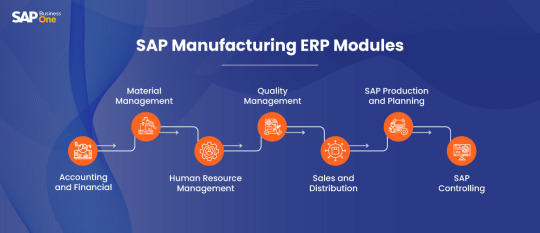
SAP offers a mix of functional and technical modules, each delivering powerful results for the manufacturing process:
1. Accounting and Financial
Manages financial transactions and audit trails efficiently across all business sizes. Integrates all financial data in one dashboard for quick, accurate decision-making.
2. Material Management
Ensures raw material availability by streamlining procurement, storage, and inventory processes. Also supports automated invoice creation and vendor interactions.
3. Human Resource Management
Manages workforce operations with care and structure, boosting employee engagement and overall efficiency. Critical for fostering a productive workplace culture.
4. Quality Management
Maintains quality standards at every stage—from raw material intake to final product delivery. Ensures compliance with industry norms.
5. Sales and Distribution
Tracks sales orders and delivery schedules with ease, while aiding inventory and revenue forecasting. A vital tool for smooth distribution.
6. Production and Planning
Offers centralized planning by leveraging real-time data, streamlining sales, operations, and material requirements efficiently.
7. SAP Controlling
Provides oversight and real-time monitoring of business processes. Supports budgeting, forecasting, and performance tracking.
Each of these modules plays a significant role in helping manufacturers optimize operations and achieve growth.
Benefits of SAP Manufacturing
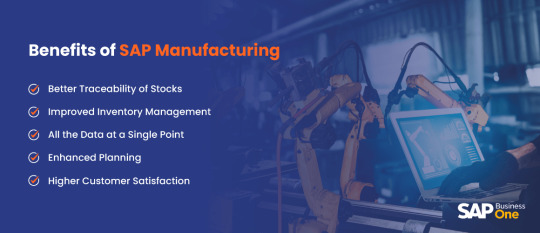
Here are the standout business benefits manufacturers can gain by adopting SAP Business One:
Better Traceability of Stocks
Minimizes manual tracking errors by maintaining accurate stock levels and providing insights into expiring components.
Improved Inventory Management
Automates and organizes warehouse logistics through advanced tools like bin location tracking for greater visibility and control.
Unified Data Access
Eliminates siloed systems by consolidating all critical data into one accessible platform, improving cross-departmental efficiency.
Smarter Planning
MRP Wizard enables scenario planning for procurement and production to ensure better preparedness and decision-making.
Enhanced Customer Satisfaction
Automates order processing and query handling, offering faster response times and more personalized service.
SAP ERP Supports Multiple Manufacturing Types
SAP solutions can be tailored for various manufacturing models:
Process Manufacturing – e.g., pharmaceuticals, chemicals, F&B
Repetitive Manufacturing – e.g., electronics, automotive parts
Discrete Manufacturing – e.g., toys, furniture, appliances
Features of SAP Business One for Manufacturing

SAP B1 offers a range of manufacturing-centric features, including:
Warehouse Management – Optimize stock movement and reduce surpluses.
Machine Planning – Minimize overspending and maximize ROI.
Production Planning – Integrated with PLC and dependent operations.
Costing Tools – Accurate margin analysis and forecasting.
Key Product Costing – Use HANA to drive structured cost calculations.
Production Management – Real-time status updates and cross-functional reporting.
Planning & Consumption – Support for JIT and FIFO strategies.
Quality Control – Built-in compliance tools and automatic certifications.
Production Cycle Monitoring – End-to-end tracking and optimization.
SAP for Small Manufacturing Businesses
Small manufacturers can benefit immensely from SAP’s automated, scalable ecosystem. It helps manage all aspects—production, inventory, procurement, and sales—within a single, intuitive platform.
SAP Digital Manufacturing
SAP Digital Manufacturing Cloud enhances operations by providing:
Performance Visibility – Unified analytics to assess productivity.
Process Transparency – Real-time data integration via MOM.
Consistent Reporting – Actionable insights for instant decisions.
Adaptive Manufacturing – Flexibility to meet diverse market demands.
Resource Efficiency – Minimized downtime and optimized output.
Key Functional Areas of SAP in Manufacturing
Major functionalities include:
Financial operations (A/R, A/P, cash flow)
Inventory & SCM (lot tracking, raw materials)
Real-time shop floor control and costing
BI tools for workflow and attendance tracking
BOMs, routing, logistics, and CRM integration
Why You Should Adopt SAP for Manufacturing
SAP Business One offers:
Streamlined operations with real-time insights
Automation across functions, boosting agility
Enhanced supply chain and customer management
Seamless warehouse and eCommerce integration
Long-term scalability and efficiency
Why Choose Silver Touch for SAP Implementation?
Silver Touch Technologies is a seasoned SAP Business One partner. Here’s what sets us apart:
Deep domain knowledge and process consulting
End-to-end SAP solution planning and execution
Custom add-ons tailored to your operations
Integration with MES and legacy systems
Trusted by SMEs and large enterprises globally
24x7 technical support as a certified SAP Partner
Conclusion: SAP in Manufacturing
In conclusion, SAP ERP is a transformative solution for small and mid-sized manufacturing businesses. It supports intelligent, connected, and scalable manufacturing with features designed for modern industrial needs. Partnering with a reliable SAP provider like Silver Touch ensures your manufacturing unit is ready for the future.
Source - https://sap.silvertouch.com/blog/sap-business-one-for-manufacturing
#SAP Business One Manufacturing#SAP Business One Manufacturing Industry#SAP Business One manufacturing solution#SAP Manufacturing ERP Modules
0 notes
Text
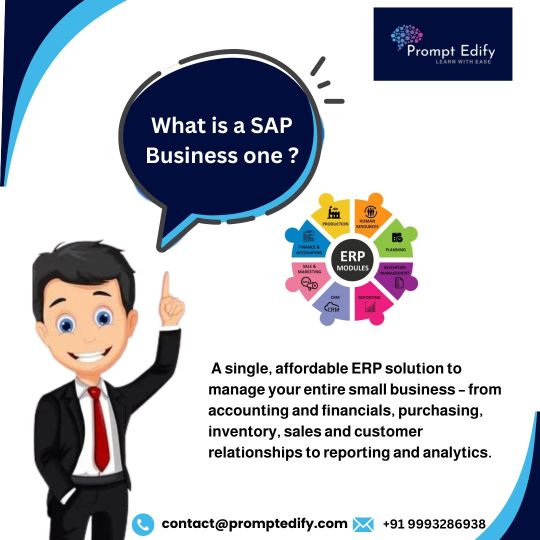
Overview:
SAP Business One (SAP B1) implemented at Prompt Edify, Rwanda, serves as an integrated enterprise resource planning (ERP) solution tailored for small and medium-sized enterprises (SMEs).
Streamlined Operations:
Facilitates seamless management of core business functions including accounting, sales, purchasing, inventory, and production, enhancing operational efficiency.
Localized Adaptation:
Customized to meet specific business requirements and comply with Rwandan regulatory standards, ensuring legal and financial compliance.
Enhanced Financial Management:
Enables accurate financial reporting, budgeting, and forecasting, empowering Prompt Edify with insightful decision-making capabilities.
Inventory Optimization:
Provides real-time visibility into inventory levels, facilitating better inventory control, reducing stockouts, and optimizing procurement processes.
Streamlined Sales Process:
Automates sales processes from lead generation to order fulfillment, improving customer satisfaction and sales performance.
Improved Customer Relationship Management (CRM):
Centralizes customer data, enabling Prompt Edify to deliver personalized experiences, strengthen customer relationships, and drive loyalty.
Data-driven Insights:
Generates comprehensive reports and analytics, empowering Prompt Edify with actionable insights to identify trends, opportunities, and challenges.
Scalability and Growth:
Supports business expansion by offering scalability, flexibility, and easy integration with other systems as Prompt Edify grows and diversifies its operations.
User-friendly Interface:
Intuitive interface and user-friendly features enhance employee productivity, reducing training time and ensuring rapid adoption across the organization.
Tech Support and Maintenance:
Access to ongoing technical support and maintenance services ensures smooth operation and timely resolution of any issues, minimizing downtime.
Long-term Value:
Investment in SAP Business One offers Prompt Edify long-term value through increased operational efficiency, cost savings, and sustained growth in the dynamic Rwandan market.
Implementing SAP Business One at Prompt Edify underscores a strategic commitment to leveraging advanced technology to drive innovation, efficiency, and competitiveness in Rwanda's business landscape.
📱 (+91) 99932 86938 📧 [email protected] 🌐 www.promptedify.com 🔗 You can chat with us on WhatsApp 📑 Book you spot now👉 Register Now
#sap certification#sapconsultant#sap consulting services#sap online training#sap fico course#sap modules#sap_certification#career in sap#sap business one
2 notes
·
View notes
Text
Optimize Your Retail Operations with SAP Business HANA
In today’s highly competitive and rapidly evolving retail landscape, businesses need more than just a traditional ERP system—they need real-time insights, data-driven decision-making, and seamless operational efficiency. This is where SAP Business HANA steps in as a transformative solution.
What is SAP Business HANA?
SAP Business HANA is a powerful in-memory computing platform that allows businesses to process massive amounts of data in real-time. It provides advanced analytics, intelligent automation, and an integrated view of business operations—all of which are critical for modern retail success.
By combining transactional and analytical capabilities, SAP Business HANA enables retailers to make faster, smarter decisions that enhance customer experiences and drive profitability.
Why Retailers Need SAP Business HANA
Retail businesses deal with high volumes of transactions, fluctuating inventory, changing customer behavior, and seasonal demand patterns. To stay ahead, retailers must leverage technology that supports:
Real-time inventory tracking
Personalized customer engagement
Faster order processing
Optimized supply chain management
Dynamic pricing strategies
SAP Business HANA delivers these capabilities through high-speed data access, intuitive dashboards, and predictive analytics—making it the ideal solution for retail companies looking to gain a competitive edge.
How SAP B1 HANA Powers Retail Growth
For small and mid-sized retail businesses, SAP B1 HANA (SAP Business One on HANA) offers an affordable, scalable solution built on the power of SAP’s HANA technology. It’s designed to simplify complex retail operations and offer real-time insights into key business functions.
With SAP B1 HANA, retailers can:
Monitor inventory in real-time across multiple stores or warehouses
Analyze customer buying behavior and trends
Forecast demand based on historical data
Manage vendors, purchases, and pricing with greater accuracy
Access mobile dashboards and performance metrics anytime, anywhere
Explore Key SAP B1 Modules for Retail
SAP B1 modules are the building blocks of the SAP Business One solution, tailored to meet the specific needs of retail operations. Some essential modules include:
Sales & Customer Management – Track customer orders, preferences, and support interactions
Inventory & Distribution – Monitor stock levels, set reorder points, and streamline logistics
Financial Management – Gain visibility into profit margins, cash flow, and expenses
Purchasing & Vendor Management – Simplify supplier communications and procurement
Business Intelligence & Reporting – Generate customized reports and visualizations
These modules work together seamlessly, offering retailers a unified platform to manage all operations with agility and precision.
Benefits of SAP Business HANA for Retailers
Here are some of the top advantages of implementing SAP Business HANA in retail:
Improved customer satisfaction through personalized experiences
Efficient inventory management to reduce stockouts or overstocking
Better demand forecasting with predictive analytics
Real-time decision-making for promotions, pricing, and product placement
Increased profitability with optimized operations and cost control
Final Thoughts
Whether you're a boutique shop or a multi-store retail chain, embracing SAP Business HANA can unlock new levels of efficiency, customer engagement, and growth. With the added strength of SAP B1 HANA and the flexibility of SAP B1 modules, retailers can transform their operations and stay ahead in the competitive marketplace.
Ready to take your retail operations to the next level? Explore how SAP Business HANA can make it happen—smarter, faster, and more efficiently.
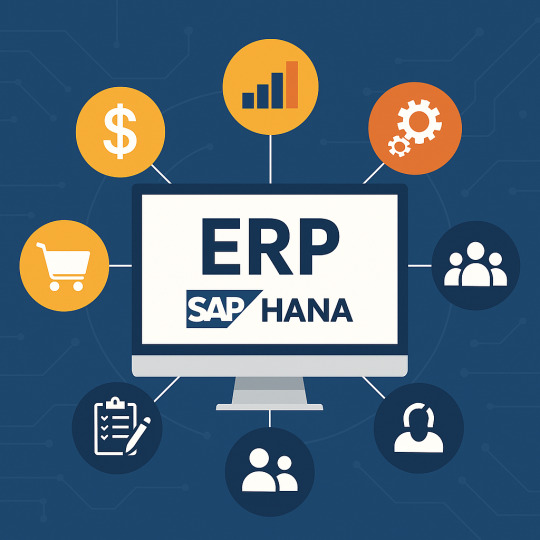
0 notes
Text
Drive Growth with ERP in the Pharma Industry
Discover how ERP for Pharma Industry is transforming business operations and ensuring stringent compliance and enhanced efficiency. These powerful systems tackle key challenges, including strict regulatory adherence, complex R&D processes, and critical quality control measures, ultimately streamlining operations. By optimizing resource management and refining workflows, ERP for pharma industry empowers pharmaceutical companies to consistently meet regulatory demands while accelerating product development and upholding high-quality output, driving sustainable growth in this highly regulated landscape.
#erp for pharma industry#erp software for pharma#sap in pharma industry#sap pharma modules#what is sap in pharma#erp for pharma#erp for pharmacy
0 notes
Text
Key Differences Between SAP ECC and SAP S/4HANA: A Detailed Comparison - Pinnacle SAP has led enterprise resource planning (ERP) software for decades, helping businesses streamline operations. As SAP ECC transitions to SAP S/4HANA, companies must understand the key differences to make informed decisions. This article comprehensively compares SAP ECC and SAP S/4HANA, helping businesses choose the right ERP software. 1. Architecture and Database SAP ECC: SAP ECC (ERP Central Component) is an older generation of SAP ERP software that supports multiple third-party databases, such as Oracle, IBM DB2, and Microsoft SQL Server. However, it relies on traditional relational database structures, which may lead to performance limitations when processing large datasets. SAP S/4HANA: SAP S/4HANA is built exclusively. Join us now [email protected]

#sap ecc to s4hana migration#s4 hana implementation#sap s4 hana modules#s4 hana migration steps#sap s4 hana training#s4 hana transformation
0 notes
Text
SAP Technical Modules: Features and Benefits
Technical modules provide the backbone for SAP ERP systems. Support functional modules with installation, implementation, and integration.
Read more -
https://praxisinfosolutions.com/blog/what-benefits-can-sap-technical-modules-bring-to-your-business/
0 notes
Text
Looking for the Best Recruiting Software Solutions? Just contact INK IT Solutions! We have vast experience in different industries such as healthcare, food & beverages, IT, manufacturing, etc. For more information, you can visit our website https://inkitsolutions.com/ or call us at 9891663202
0 notes